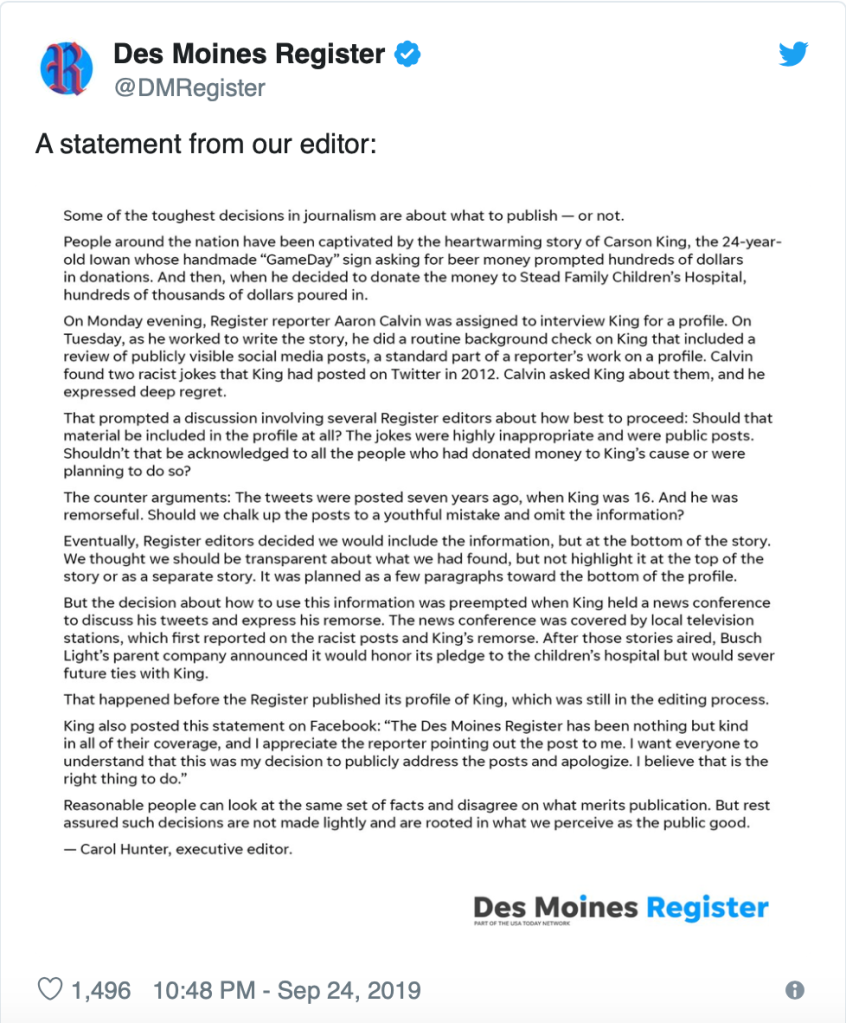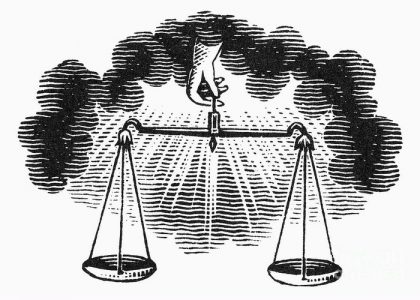
It had the makings of a viral success story: A young man jokingly holds a handmade sign asking for beer money in front of ESPN “College Game Day” cameras in Ames, Iowa. His cameo appearance goes viral and thousands of dollars flow into his Venmo account, at which point the lucky student announces he will donate all of it (“all but enough for a case of Busch Light”) to the University of Iowa Stead Family Children’s Hospital. After announcing on Twitter that he was “turning beer money into donations to [Children’s Hospital],” endorsers started lining up, including Anheuser-Busch and Venmo. Within a few days, 24-year-old Carson King raised $67,000. And more money was coming in. Estimates had him raking in at least $200,000. Maybe even $1 million.
Then the Des Moines Register did a “routine background check” on King and everything came crashing down. While writing a story on King, reporter Aaron Calvin looked into his Twitter account, finding two “offensive tweets” King had sent 7 years earlier when he was 16 years old. The Register described the tweets as “racist jokes.”
Before the Register published its profile online, King held a press conference to apologize for the posts and to announce that Anheuser-Busch had ended its partnership with him. (It is unclear what prompted Anheuser-Busch to end the deal since the Register’s story had yet to be published.) Nevertheless, the beer maker still promised to donate the more than $350,000 it had already pledged to the University of Iowa Hospitals & Clinics. But King’s press conference and Anheuser-Busch holding to its promise didn’t keep the Register from pursing publication.
When his profile appeared, references to his tweets were mentioned toward the end of the piece and weren’t the focus of the story. Here’s an excerpt:
“A routine background check of King’s social media revealed two racist jokes, one comparing black mothers to gorillas and another making light of black people killed in the holocaust. The joke tweets date back to 2012, when King was a 16-year-old high school student. When asked about the tweets, King was remorseful and thanked the Register for pointing them out, saying they made him ‘sick.’ He has since deleted them.”
At the same time, the Register’s executive editor published––online and on Twitter––a lengthy explanation on the paper’s decision to publish the story on King and his background (see below).

What readers didn’t know is that King wasn’t the only person who was guilty of publishing “racist” tweets; it turned out that Calvin––the reporter––had published some of his own. Some readers who were upset with the Register’s reporting decided to do some digging. According to The Washington Post, after looking through Calvin’s Twitter feed they “soon found several [offensive tweets] that appeared to be at least as problematic as King’s two racist jokes.” The Post noted that “between 2010 and 2013, Calvin published tweets that used a racist slur for black people, made light of abusing women, used the word ‘gay’ as a pejorative and mocked the legalization of same-sex marriage by saying he was ‘totally going to marry a horse.’”
The Register’s explanatory statement on Twitter was soon flooded with images of the reporter’s offensive comments. Shortly thereafter, Calvin began deleting old tweets, and then locked his account after posting an apology. He wrote, “Hey just wanted to say that I have deleted previous tweets that have been inappropriate or insensitive,” he wrote on Twitter. “I apologize for not holding myself to the same high standards as the Register holds others.” As of this writing, the Register has merely said that they had been made aware of offensive tweets made by “a staffer” and are investigating.
This case certainly raises a number of issues. The Washington Post cites this as another example of “cancel culture:” Penalizing people, namely celebrities, after their moral transgressions come to light by dropping endorsements, firing them, or canceling their programs. Such was the case several weeks ago when Saturday Night Live dismissed a new cast member after racist comments were discovered in some of his past podcasts. The nature of cancel culture and what brought it about is a topic worth considering, for it speaks to social norms and the state of moral relativism.
However, the more pressing issue from a journalistic perspective is the practice of journalists undertaking background checks on those who they cover. Unfortunately, there seems to be no steadfast rules on when, where and how they should be conducted, and under what pretenses. The Society of Professional Journalists seems to offer little guidance on how and when background checks, presumably of sources, should be conducted. Thus it seems that newsrooms must themselves establish policies for their reporters to follow.
Certainly there are times when journalists should perform background checks as a matter of best practices or due diligence––for example, when a journalist has reason to question the character or veracity of a source for an important story. But herein lies a troubling double standard: If undertaking background checks is a matter of routine for journalists, shouldn’t it also be a matter of routine for news organizations themselves? In other words, shouldn’t news organizations undertake background checks, and perhaps even perform them periodically, on the reporters they employ? If anything, as a matter of transparency?
There seems to be a real need for guidelines. The missteps taken by Calvin and the Des Moines Register seem to be only the latest demonstrations of why such guidelines may be necessary. Readers may recall the case of Charles Ramsey who, while being lauded as a hero for helping to rescue girls who had been kidnapped, was revealed by a reporter to have been the subject of domestic violence charges. Critics argued that reporting on Ramsey’s past was not necessary and may have diminished the goodness of his actions.
The need for background checks in reporting may certainly be debated. Having guidelines to work from as a starting point would help inform the debate and help reporters to not harm sources, to not undermine the news value of stories, and to infuse more accountability into journalism itself.
Many thanks to JMC major Angela Hutchings for the tip.
Sources: desmoinesregister.com; The Washington Post (via omaha.com)
UPDATE (September 30, 2019): Aaron Calvin was fired from the Des Moines Register. In an interview with BuzzFeed News he said he felt “abandoned” the paper.

This essentially raises the topic of ‘the right to be forgotten’. The podcast Radiolab did an episode on exactly this a few weeks ago. It included a discussion of a midwest newspaper that adjudicates requests from readers to delete their names from old news articles. The process was rather arbitrary, but it pointed out that in the digital age, nothing gets lost or forgotten. Google someone’s name and everything The Oracle knows about that person is there for examination. In the not-so-old old days, when the newspaper was tossed out so was public record of that person and event… unless someone wanted to spend days in a musty storage room going through microfiche. Stuff that should probably be forgotten, was.
In the pre-Google age, Carson King would have been free and clear and frankly, the earth would have stayed on its axis regardless of what he said at 16. If people change and learn from their mistakes (most do), is there any point in dredging up stuff that isn’t representative of that person today?
As always, well said Brock. Thank you so much for continuing to follow our blog and for taking the time to comment. You’re right—back in the day King would have retained his deal with A-B, he would have raised perhaps even more money for a worthy cause, and all would be well. Then again, back in the day his appearance on “Game Day” wouldn’t have gone viral and wouldn’t have raised the cash that it did. As you suggest, there should be a point to digging up 7-year-old information written when someone was a teenager. Again, to me this points to a need to establish some guidelines or rules of engagement for such things labeled as “background checks.” For starters, it would be helpful to define what a background check is, what its scope should be, and when and with whom should it be undertaken.